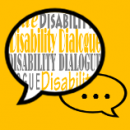- A
- A
- A

- I am ten years old and can’t cut my food with a knife and fork. My hands are too shaky. I can’t grip the knife. “What are you going to do when you’re on a date with a boy? Ask him to cut your meat?” my mom asks, rolling her eyes. She asks me that all the time. I don’t care. I am ten and boys are irrelevant. I do not realize what I am learning, or maybe I have already learned it.
- I am seventeen years old and there is chicken on my plate and I am sitting across from my new boyfriend, my first boyfriend, and I start to cry when he asks why I’m not eating. “Why would I give a shit about a stupid thing like that?” he says when I tell him. He cuts my chicken. I decide that I love him.
- I am in college. “Nobody would take a girl with a limp on a date” says a boy in my psych lecture. We read Ulysses in my lit class. Gertie MacDowell’s sexual appeal vanishes as soon as the narrative reveals that she walks like me. I have seven missed calls. My boyfriend forgot I had class. A friend invites me to lunch, and I decline- I’m already in big trouble. I answer the eighth call. I’m so sorry, baby, I had class. My phone was off. I didn’t mean to scare you. No, I don’t have any plans.
- My boyfriend is visiting for a week. He is getting community service credit for helping the disabled. It’s a joke, a way to get out of a lousy assignment. His teacher told him he was brave, for dating a girl like me. We make fun of her.
- My boyfriend cuts my food with a knife and fork. I am not hungry. I have a stomachache. When I refuse to eat, he spears individual bites on my fork and puts them in my mouth. I obediently swallow each bite. I don’t know what he’ll do if I don’t.
- I walk down to the dining hall with my boyfriend and I don’t take my cane. I am just getting used to using a cane and I don’t like the way it looks. The dining hall is at the bottom of an icy hill. My boyfriend holds my arm so I don’t fall. At dinner, I say the wrong thing. He walks up the hill backwards, facing me, laughing at me. “Come on,” he says, laughing. I take tiny steps up the hill, not sure what he’ll do if I fall. My legs shake from the cold and the strain. ”Come on,” he says. “Come on.” He is laughing. I am afraid of the hill, of the ice in the dark, of my boyfriend.
- It takes me three more years to break up with that boyfriend. “Who else is going to love you?” he asks. It’s a stupid thing for him to say. Doesn’t he realize I’ve already factored that in? Why does he think it took me so long to leave?
- I have a new girlfriend. She is great. She’s disabled too. We help each other out. Things are good. When ordering food in restaurants, I still automatically eliminate anything I would need to cut with a knife and fork.
One out of every two women with disabilities is abused in her lifetime, compared to one out of every four women without disabilities. We tend to stay in abusive relationships longer and contend with disability-specific forms of abuse . Abusers can withhold medications, break assistive devices, and refuse to provide support. We are often dependent on our abusers for physical support- transportation or showering or meal preparation, for example. This makes it more difficult and more dangerous to leave .
On top of this, we’re exposed over and over to the ideas that we’re unattractive and unlovable because of our disabilities. We learn that we’re burdensome, that it takes a special person to care about us. These cultural narratives make us more vulnerable to abuse. Once we internalize these things, we expect less from our partners. We start to believe we deserve what we get. We think, well, who else will love us?
I got out. I’m safe now. I’m glad to see abuse surface more and more in the public discourse. Talking about it relieves some of the stigma and makes it more likely that people in abusive relationships will be able to find resources and support. It’s only through a diversity of experiences that we begin to see the whole picture, so I wanted to add my voice to the discussion and highlight the ways that my disability impacted my abuse.